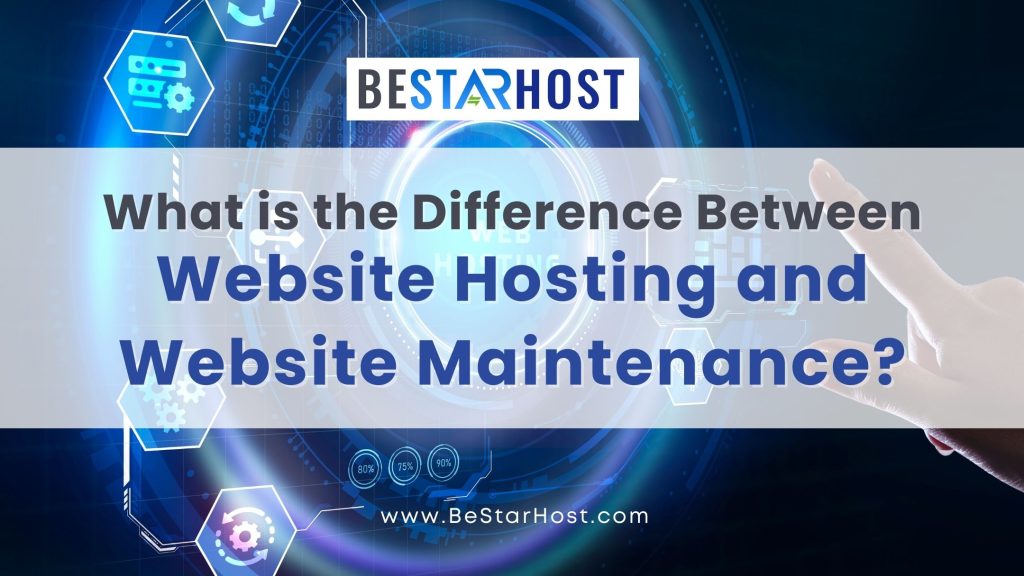
Navigating the Digital Realm: Unraveling the Distinction Between Website Hosting and Maintenance
In the intricate web of website management, two crucial components play a pivotal role: website hosting and website maintenance. Often used interchangeably, these terms actually represent distinct aspects of managing a website’s performance, security, and functionality. In this comprehensive guide, we’ll delve into the disparities between web hosting and maintenance services, elucidate their significance, and explore the best practices for optimizing each to ensure a seamless online presence.
Understanding Website Hosting:
Website hosting serves as the foundation of your online presence, akin to leasing a plot of land to erect a building. It involves storing your website’s files, data, and content on a server, thereby making it accessible to users worldwide. Here’s a breakdown of its key characteristics:
- Server Storage: Web hosting providers allocate space on their servers to store your website’s files, including HTML, CSS, images, videos, and databases.
- Server Accessibility: When users enter your website’s domain name into their browser, the hosting server delivers the requested files to display the site’s content on their screens.
- Server Maintenance: Hosting services entail maintaining server hardware, ensuring uptime, and troubleshooting technical issues to prevent website downtime.
- Types of Hosting: There are various types of hosting, including shared hosting, VPS (Virtual Private Server) hosting, dedicated hosting, and cloud hosting, each offering different levels of performance, scalability, and security.
Exploring Website Maintenance:
While website hosting focuses on the infrastructure and storage of your site’s files, website maintenance revolves around optimizing its performance, security, and user experience. Think of it as the ongoing upkeep and fine-tuning required to keep your digital storefront polished and functional. Here’s what it entails:
- Content Updates: Regularly updating website content, such as text, images, and multimedia, to reflect current information, promotions, and events.
- Software Updates: Installing updates for your Content Management System (CMS), plugins, themes, and other software components to ensure compatibility, security patches, and performance enhancements.
- Security Enhancements: Implementing security measures like SSL certificates, firewalls, and malware scans to protect against cyber threats, data breaches, and unauthorized access.
- Performance Optimization: Optimizing website speed, responsiveness, and user experience through techniques like image optimization, caching, and code minification.
- Backup and Recovery: Regularly backing up website files and databases to prevent data loss in the event of a server crash, hacking incident, or human error, and implementing disaster recovery plans.
Differentiating Between Web Hosting and Web Maintenance:
While web hosting and web maintenance are complementary elements of website management, they serve distinct purposes:
- Web Hosting: Primarily focuses on storing and serving website files, ensuring server uptime, and providing infrastructure support.
- Web Maintenance: Involves ongoing updates, security enhancements, performance optimizations, and content management to keep the website current, secure, and user-friendly.
Best Practices for Web Hosting and Maintenance Services:
To ensure a robust online presence, consider implementing the following best practices:
- Choose Reliable Hosting: Select a reputable hosting provider that offers reliable uptime, scalable resources, responsive support, and robust security features.
- Automate Backups: Set up automated backups of your website files and databases to a secure offsite location for added redundancy and peace of mind.
- Regular Updates: Stay vigilant about installing software updates promptly to patch security vulnerabilities, enhance performance, and maintain compatibility.
- Security Measures: Implement proactive security measures like SSL encryption, firewall protection, two-factor authentication, and regular malware scans to safeguard your website and data.
- Monitor Performance: Utilize monitoring tools to track website performance metrics like loading speed, uptime, and user engagement, and address any issues promptly.
- Content Management: Develop a content strategy and schedule regular updates to keep your website’s information fresh, relevant, and engaging for visitors.
BeStarHost offers a range of dedicated server plans tailored to meet the diverse needs of businesses and individuals seeking high-performance hosting solutions. With dedicated server hosting, clients benefit from exclusive access to a physical server, providing unparalleled control, security, and reliability for their websites and applications.
Key Features Across Plans:
- Reliability: BeStarHost’s dedicated servers are housed in state-of-the-art data centers with redundant power, cooling, and network infrastructure to ensure maximum uptime and reliability.
- Security: Robust security measures, including firewalls, intrusion detection systems, and regular security updates, safeguard your server and data against cyber threats.
- Performance: High-performance hardware components and optimized network connectivity deliver fast and responsive server performance, enhancing the user experience for your website visitors or application users.
- Scalability: Scalable resources allow you to easily adjust server specifications as your business grows or experiences fluctuations in demand, ensuring consistent performance and availability.
Whether you’re launching a new website, running a high-traffic e-commerce platform, or managing mission-critical applications, BeStarHost’s dedicated server plans offer the flexibility, reliability, and performance you need to succeed in the digital realm.
Conclusion:
In the dynamic landscape of website management, understanding the disparity between web hosting and web maintenance is essential for optimizing your online presence. While web hosting provides the infrastructure for storing and delivering website files, web maintenance encompasses the ongoing upkeep and optimization required to keep your site secure, updated, and user-friendly. By adhering to best practices and leveraging reliable hosting and maintenance services, you can ensure a seamless and robust online experience for your audience.
